Somewhere around 2 p.m., when the energy surge at the Women’s March in Washington, D.C., was strong enough to power the city, cochair Carmen Perez reminded the crowd of an estimated 500,000 people: "When you go home, remember why you marched." There are as many reasons, it turns out, as there were people (and there were a staggering number of people who demonstrated around the world). For many in attendance in D.C., the march wasn’t just about fighting for women’s rights or protesting Donald Trump. It was about supporting Planned Parenthood, protecting immigration rights, or voicing concerns about the future of the planet. Each person I spoke with in D.C. had a different perspective, and many of them were generous enough to share those perspectives with me. Here are the reasons why they marched, in their own words.
Twania Brewster, 44, and Her Daughter, Meredith Lakin, 10, Chicago
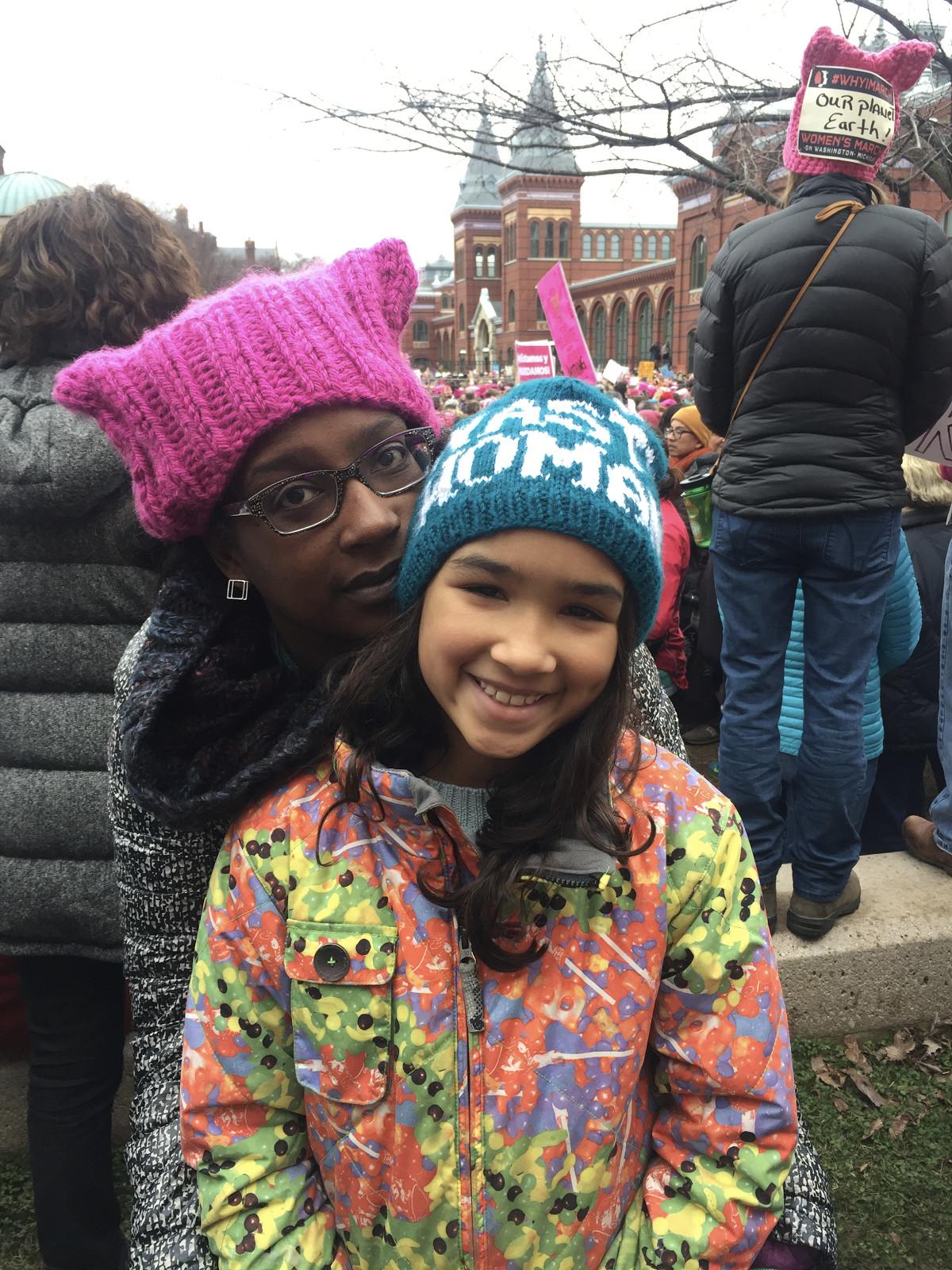
Twania: My daughter and I watched the election together and watched the election results. And when she woke up, and Hillary had lost, she turned to me and said, "Well Mommy, what do we do?" It wasn’t until I found out about the march that I knew that this was a way for me to show her that these are steps that we can take to be proactive. When we go home, we’ll find more ways that she’ll be able to engage. My parents were immigrants, my mother was a social worker — she took up, wrote letters, had us write letters for certain issues that she cared about, and the time is now for Meredith. She’ll be able to write letters, she’ll be able to do other things. I want to be able to model the right sort of activism for her.
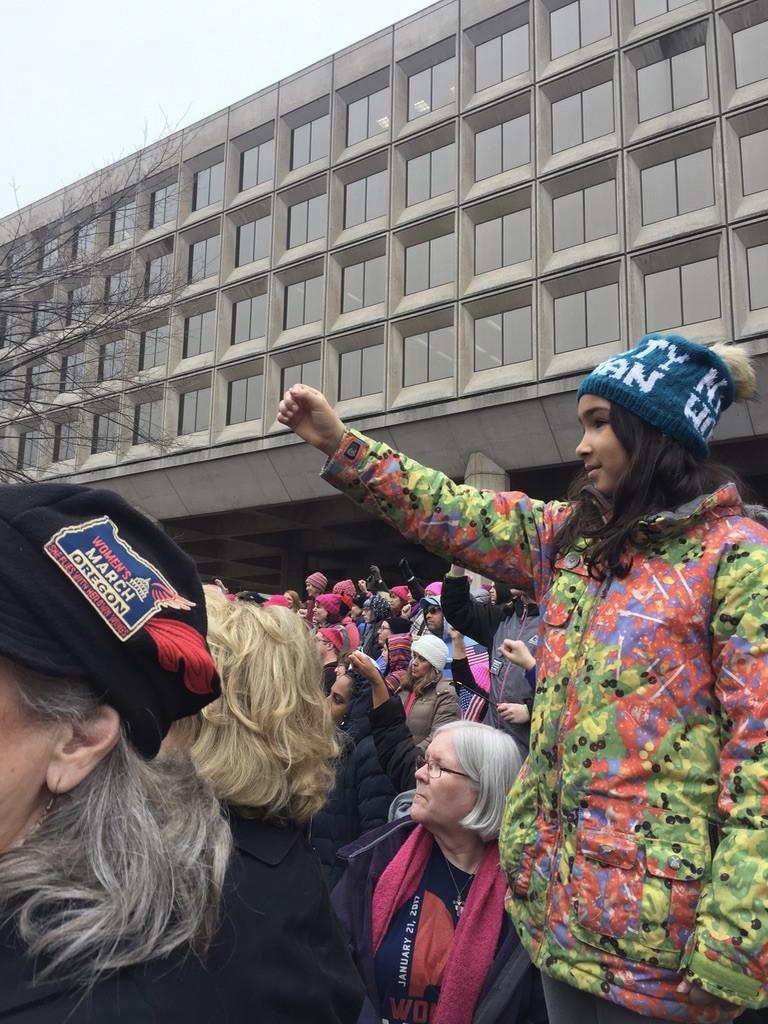
Meredith: I wanted to come so I could have my first time in Washington, D.C., and my first time at a rally or protest. And I want to say to Donald Trump, "Why do you hate women so much?"
Ruth, 75, Philadelphia
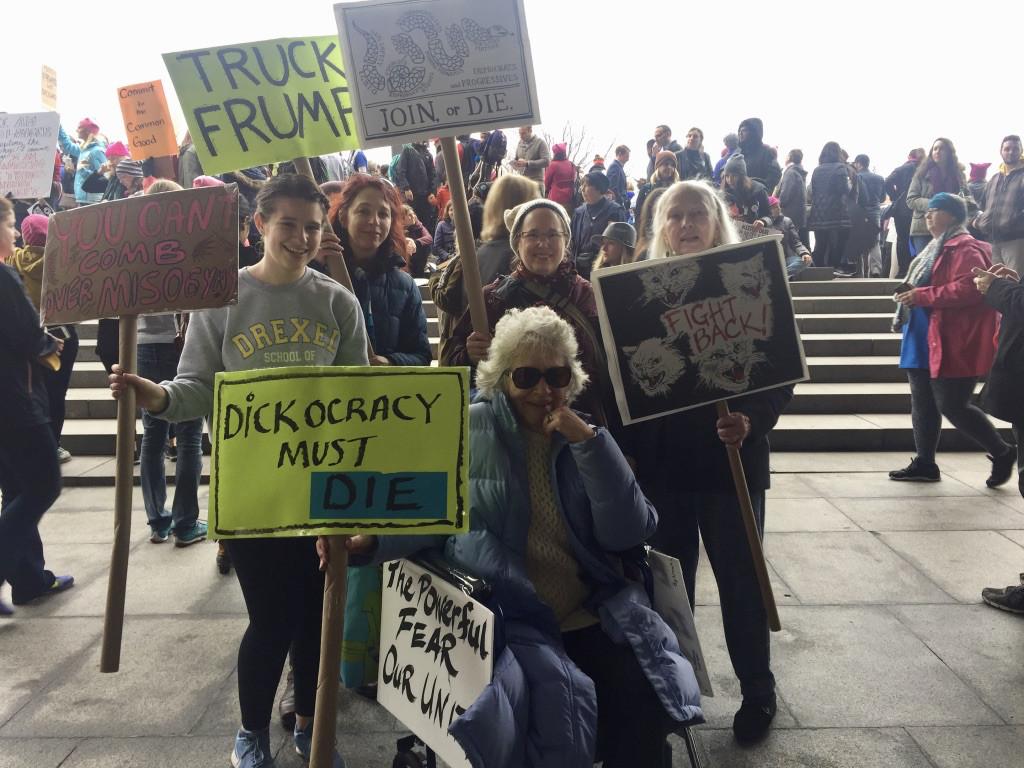
When I was small I was told I just had to get married and have children. Then the ’70s came along and freed me. I was not free till then. You have to understand the way things were: Women could not borrow money, women did not get jobs. All of a sudden, I became an engineer. It took 20 years before they would give me credit in my own name, without my husband signing. So we are not going back.
And women have to be together. I don’t care what religion you are, or what color you are, we have got to be together because men will try to screw us over again. And I have a wonderful husband — I’ve been married 53 years. It’s not about men. It’s about keeping women down. Women aren’t going to be kept down. I’m here with a broken back and I don’t care. I am here. I am here with my daughter and my niece and my two new friends who I just met. I’ll walk when I can, and when I can’t, they will push me.
Jasmine Fernandez, 27, Los Angeles
I came here for my family. I’m first generation; my parents are immigrants from Mexico. I’m originally from L.A. I didn’t think I’d have the opportunity to be here today, but I was like, I have to go and walk for women’s rights, for women of color, for my family. I told my dad yesterday — I was nervous telling him. I had a feeling he would be scared for me to come here since my family doesn’t really march or protest or do anything like that. I thought he would say, "Don’t go," or "it’s going to be dangerous, why are you doing that?" But he was very supportive. He said, "That’s amazing. Your first time in D.C. and it’s a historic event. Just stay safe. March on."
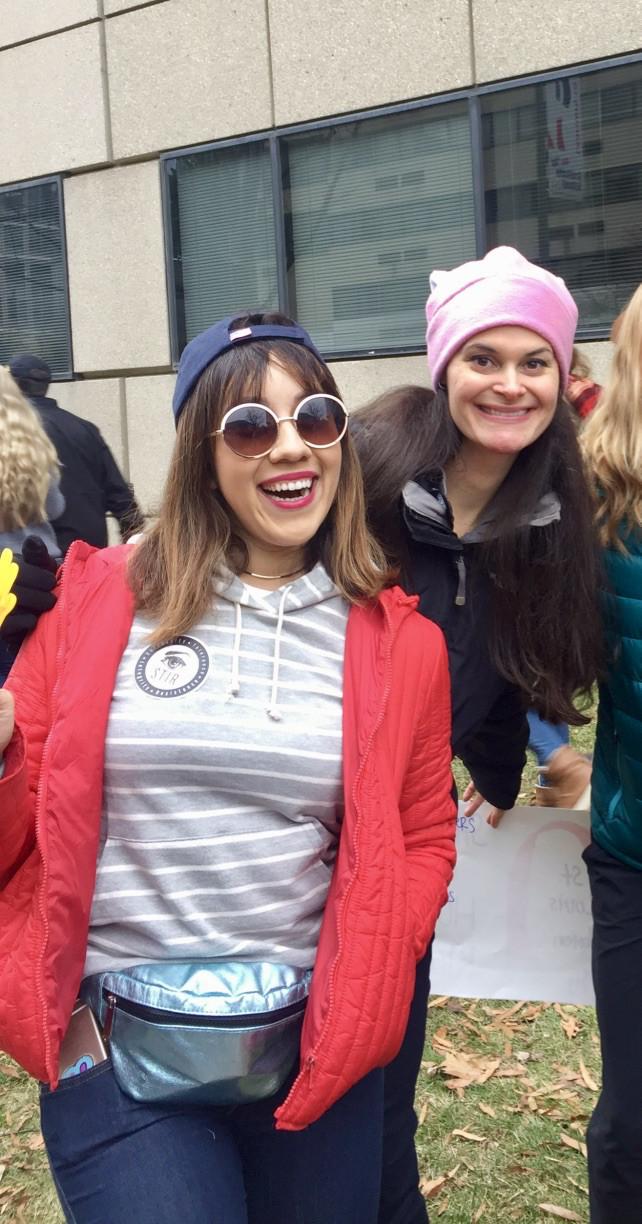
Amanda, 36, St. Louis
The reason I came today is because it is important for us to stand up for the people who have been disenfranchised, offended by [Trump], and are scared about our future. I am marching with all the people who feel that way. Obviously, there were concerns that the march would not be inclusive, but look around you. I started hearing that this dialogue was happening; people were responding to it and opening their hearts and opening their minds and making sure they were adding the voices that historically have not been included, and that’s why this was the place I wanted to be. We’re making sure to march with women of color. Making sure to march with disabled women, differently labeled women, differently labeled men! Different ages. And the number of families that are here? That’s why I came, because this march made an effort to broaden its voice and have a clear statement.
Kathy Campbell, 70, Sisters, Oregon
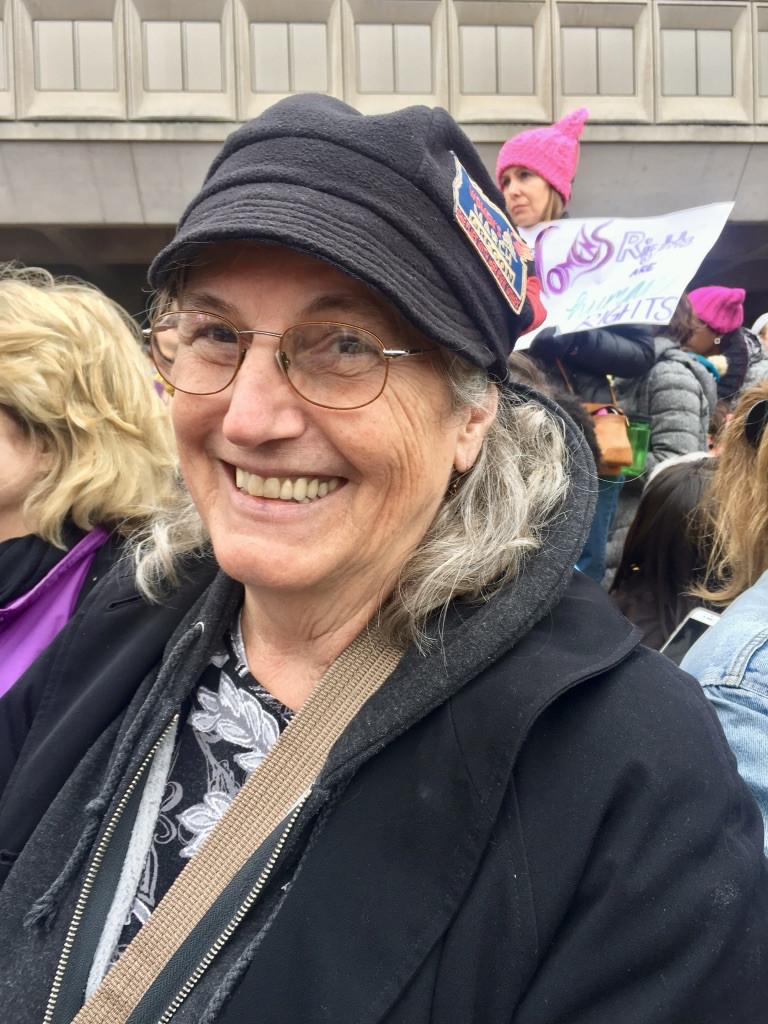
I live in Sisters, Oregon — isn’t that lovely? — and have worked since right after the election to get a march going in Sisters. They’re marching today in Bend, and I’m so proud of them, but when I heard about this march on Facebook, I made my plane reservations that same day. I’ve got four grandchildren — three grandgirls — and I just wanted to be able to tell my grandkids that I was here and that I would always have their backs. That’s what grandmas are supposed to do. I need them to know they just can’t grow up thinking that Trump is the kind of president that we want to have — that this country can get away with behaving this badly.
I was a journalist for a long time [since I was 18] and journalism professor. With that profession, you just didn’t do this. You didn’t show up for things like marches. I’ve spent my whole life not taking sides on anything, and I’m just so excited to be able to show up for this and be able to speak out, finally.
Ali Akil, 31, Cleveland, Ohio
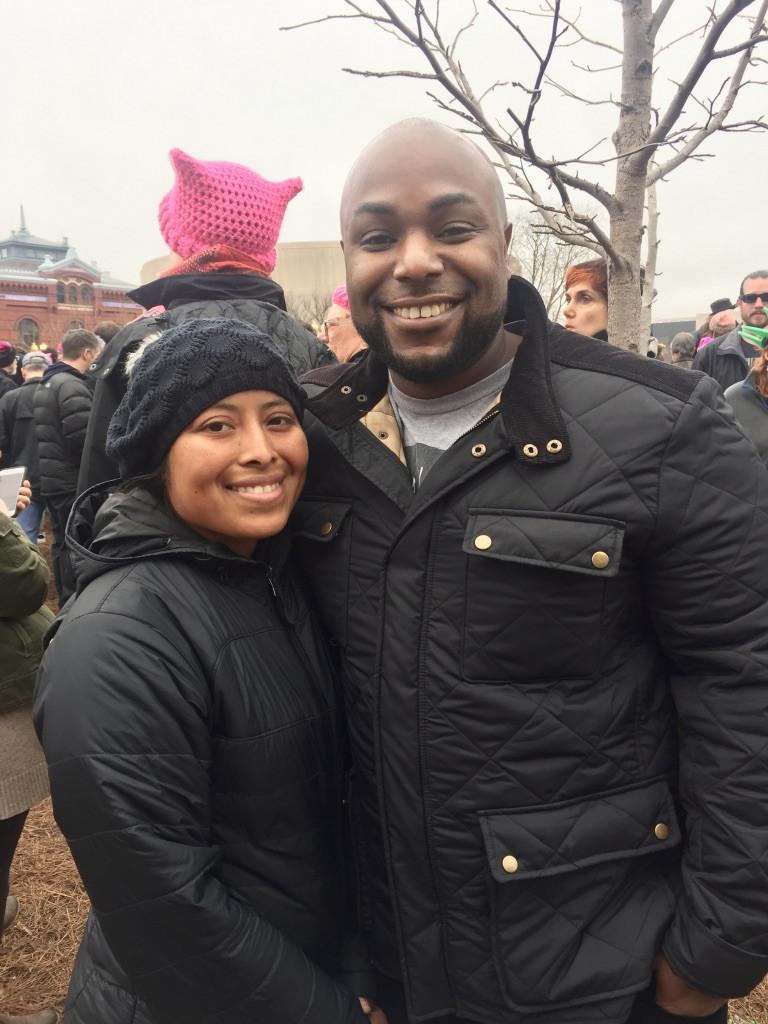
I came because I have a mother, I have aunties, I have sisters, and eventually I will have a daughter. I’m gonna tell ’em I was here, and that’s more than enough. Everybody don’t have the ability to march or fight, but I got resistance in me. I think when it’s a call going out to people, no matter what your political philosophy, no matter what you’re fighting for, everybody should come together as part of the movement. You know, you get one big movement, we all can get a piece. I’ll be at every march. If it’s a Million Man March, a women’s rights march, or if it’s a Black Lives Matter march — I’m there.
Greg, 37, and Adrian, 34, Washington, D.C.
Greg: Honestly, I live a couple blocks away, and I just wanted to come check it out. But I support everything this is about.
Adrian: Well, he lives a couple blocks away, so I came, too. I moved here last year, in March, and I’ve never experienced anything like this.
Sandra Clay, 72, Charleston, West Virginia
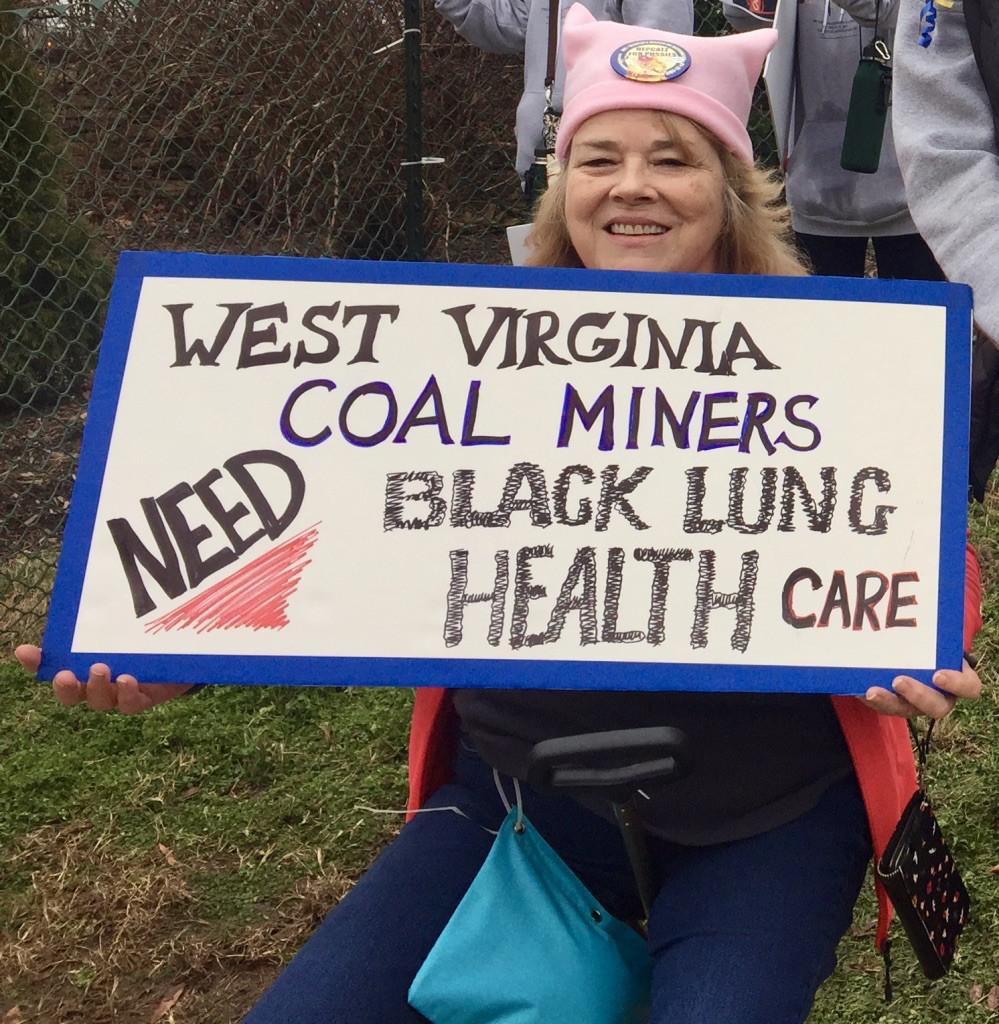
This is my first march. I came on a bus with my friends and it took about seven hours. I couldn’t sleep all night — I’m so full of energy because I’m here for my 3-year-old granddaughter. She’s very brilliant and I’ve taught her an awful lot about the presidents. She knows everything about George Washington and about Abraham Lincoln. She says that he was killed in a movie theater by John Wilkes Booth because he freed the slaves. How he did it was — and she says it perfectly — "he wrote the Emancipation Proclamation." At three years old, she can say that! And then I said who is our current president, and she loves to say his name — Barack Obama. I said what’s important about him, and she says, "He was the first black president." Then — this was before the election — I said who who is gonna be our next president, and she says, "Hillary Clinton. She will be our first woman president." She also says, "We don’t like Donald Trump" and I said why do we not like Donald Trump and she says, "Because he’s not a nice man." I tried to teach her the difference between being great and being good. People might think he’s great, but he’s not a good man. So I’m here to say: Donald Trump, we don’t hate you. We fear you, but fear is never going to silence strong women.
Imani, 34, and Her Daughters Noir, almost 2, and Paz, 4, North Carolina
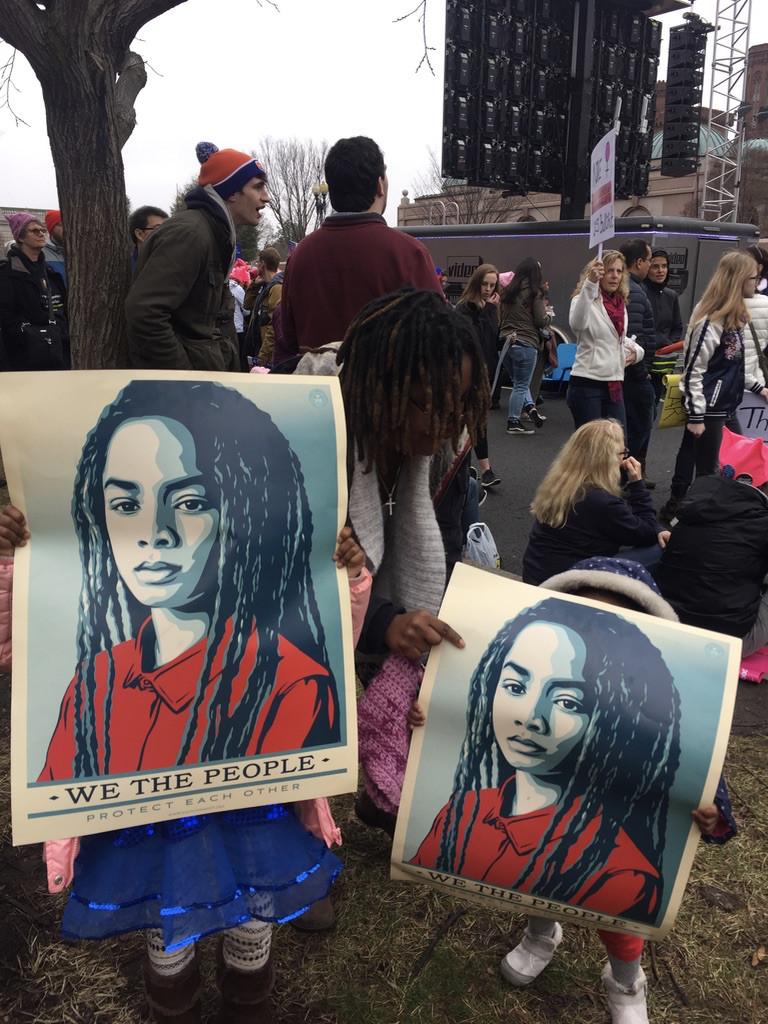
Honestly, I was on the fence until this morning, when my best friend said we had to come. As a woman of color, I feel like we’ve been through a lot recently, and I think it’s a little bit of a different struggle than what’s represented here. I couldn’t see and envision the legislative change that would come from this event today. But I’m a woman of faith, and I prayed on it, and I felt like God answered my prayer with, "You’ve gotta love, even when it’s tough." Ultimately, I feel like we should, despite all of our struggles, come together and unite and love one another. And I wanted to demonstrate to my daughters what sisterhood truly means. When I tell them about this day, I’ll tell them we wanted to be there to make a change.
Beth Jackson, 52, Vermont, and Her Daughter, Nora, 19, Emory University
Beth: I’m marching for my mom. She’s 74, she’s got breast cancer, and she’s very nervous about what is going to happen with health care — probably with Medicare in her case — but in general, she’s very concerned about it. So I called her on the way here, and I said, "Mom, what do you want me to march for? What should I put on my sign?" So I wrote about her.
Also! These are my girls! So my daughter was coming up from college, from Atlanta, and my other daughter was going to be with her sister, so I decided to I had to as well.
Nora: I’m here with my mom and sister. And also my friends from Emory. We decided to march today for a couple reasons, but mostly: We accept that Trump is president now, but that doesn’t mean that what he’s saying now is all right, and we need to continue a rhetoric of positivity, as opposed to his negativity.
The day after the election was the weirdest day ever. Walking across campus, it was completely silent. Everyone was just talking in whispers. I think it feels better to be here, it feels empowering. And it feels good to be around all these people who are conveying a positive message, as opposed to a negative one. Now it’s like: How do we spread that idea in the classroom and our residence halls, among our peers. But I guess that’s what college is for, right? To find out what we put that energy toward?
Morena Dominguez, Her Son, Rafael Urena, 16, and Her Daughter, Nevaeh Flowers, 14, New York
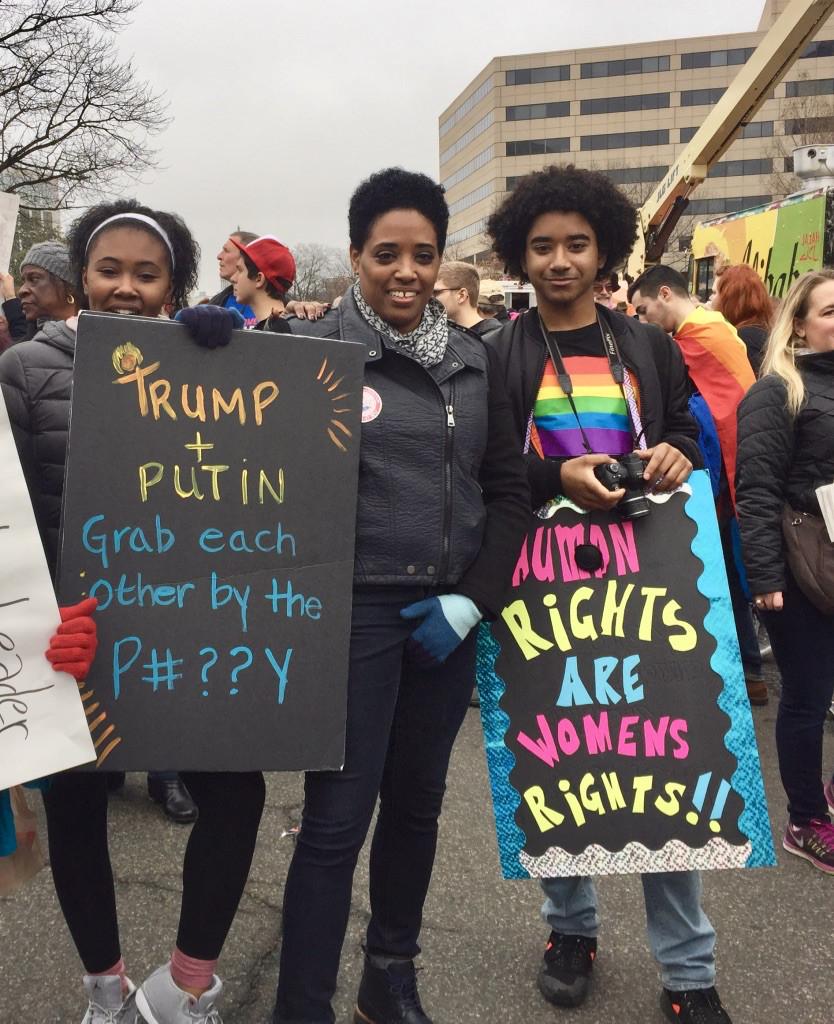
Morena: I’m here to march for my family, my sisters, my daughter, for my friends, and for other women in this country and around the world, and to let the people know that we have a voice and a voice for humanity. Not just for women, for men, also. That’s why we’re here, and there’s a lot of power in the pussy!
Nevaeh: Mom! Don’t say that!
Morena: There is! This is where all the pussy’s at.
Nevaeh: Well, I’m marching because I’m kind of afraid for what’s gonna happen next. The way everything is taking a turn, it’s really sharp. Everything is getting harder and more unfair. People from older generations are not as accepting or open-minded. And I just want females — I just want everyone to be equal and just have a say in what they want and be able to fight for themselves and everyone else.
Desiree, 40, New York
My name is Desiree, and I’m marching because I feel like this administration is undermining every facet of my identity as a woman, as a minority, an immigrant, a nurse, and an artist. I feel like [the march] is really the greatest outlet we have at this point for fighting all of the insane emotions I’m having in my body right now, so the solidarity is an amazing place to be. But also, I’m absolutely in support of people who are not here, who don’t feel safe or included.
Emily Lintag, 31, New Jersey
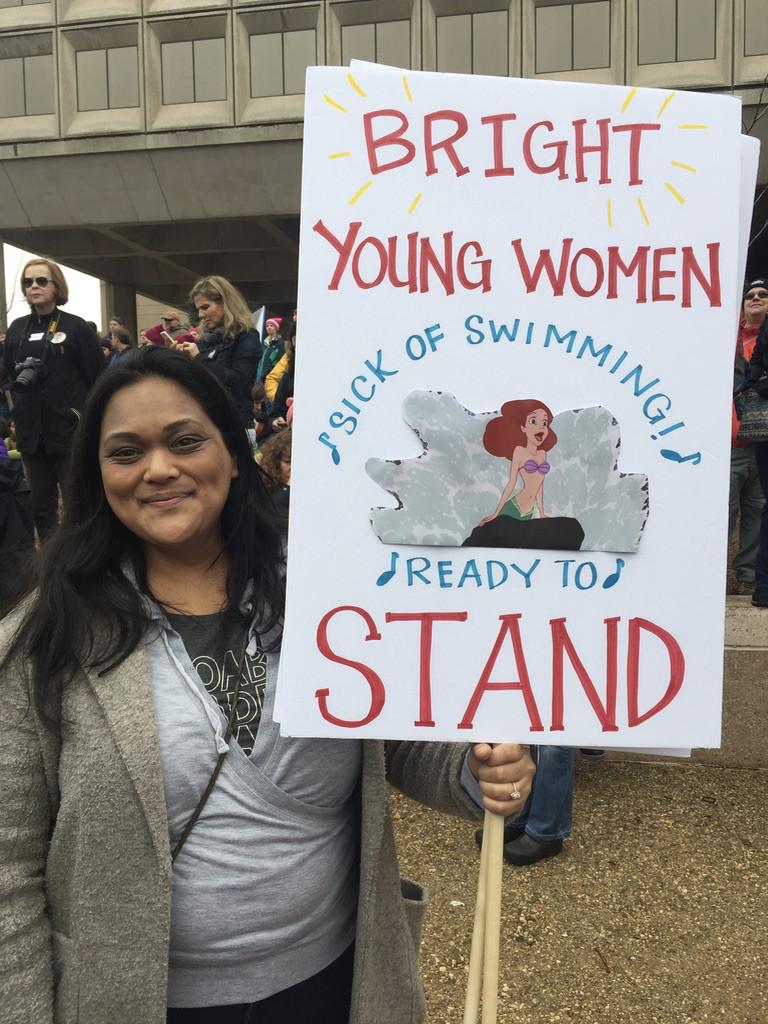
Why not [march] is a better question? I mean, it’s just awesome seeing all these young kids here, and I think like half the crowd is men. Everybody’s here supporting a common cause, and there’s just numerous reasons — women’s rights, gender equality, equal pay, reproductive rights, the list goes on — and it’s just awesome. It’s really peaceful, and everyone is extremely respectful.
This is my first big event like this, but you know, I come from a family that immigrated from a third-world country [the Philippines] and our family gave up everything to come here. And my generation’s doing great, and that’s the American Dream. I have a house with a white picket fence, my husband works at the Department of Energy, working in environmental science as a plasma physicist, and I’m a nurse. We went into things that are public service, and we do well for ourselves, because our family gave up everything to come to the states. That’s the dream, and we’re here to protect it.
LaTania Gray, 46, Detroit
I am marching because: (1) Trump is not my president. (2) Every person on this earth — man, woman, color, un-color — everybody should have an equal right and opportunity. And most importantly, that as a woman, my rights matter. So why should I give ’em away because one person don’t agree with me?
I’m here as a union worker. I work for General Motors, and one of the things that Trump stated — that union workers make too much money — that’s totally not true. We work very hard for what we get, and the unions stand strong on that. Our voices are going to be heard. Trump needs to know that, or his administrators need to know that. We are not taking this lying down. We are very serious about our rights. And as a woman, I want him to know that this is my body, this is my life. He will not insult it by saying the words that way. He may not respect women, but we are who we are, and we’re not going anywhere. A lot of us didn’t have the rights and the opportunities that we have now; many of us are here because of Obamacare. If it wasn’t for that, a lot of my ladies wouldn’t be out here today because of breast cancer or uterine cancer.
I’m emotional right now. A lot of us are. This is a lot to us. It means everything to us.
These interviews have been condensed and edited for clarity.